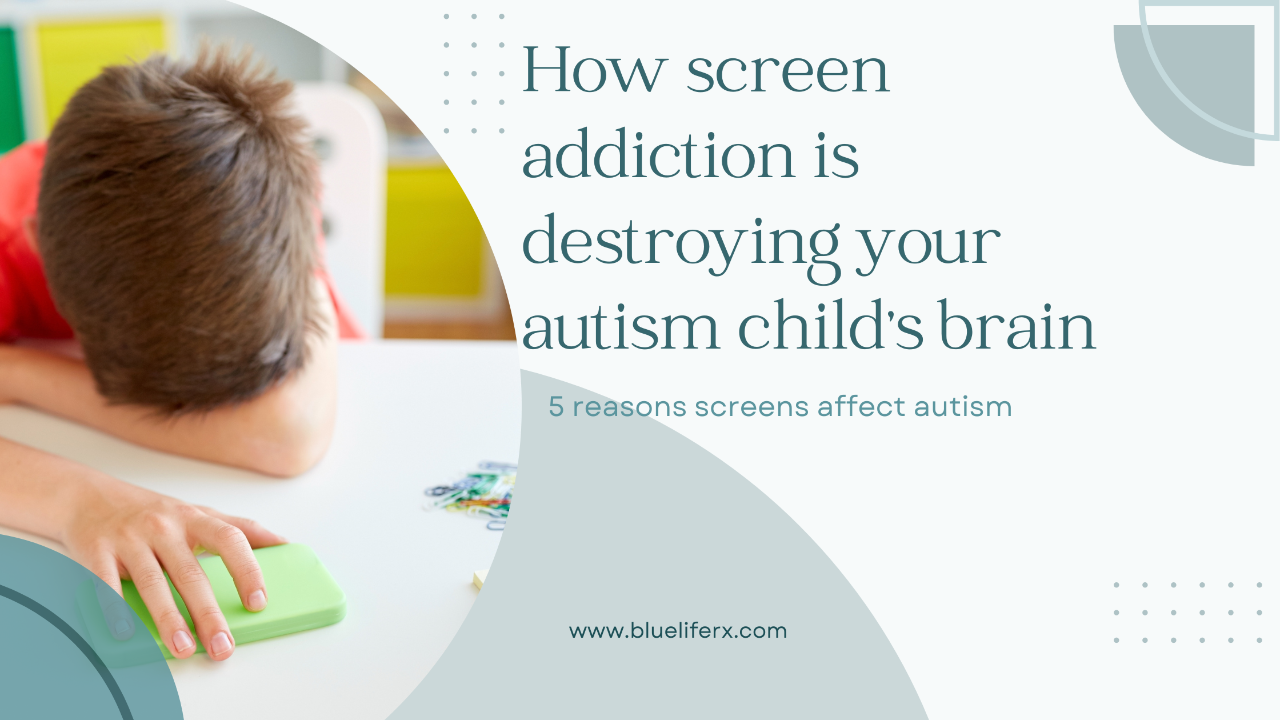How screen addiction is destroying your autism child's brain
Jul 20, 2023
As a mom blogger, my journey with autism has taught me the importance of understanding how various factors can impact our children's development. One aspect that has caught my attention is the influence of screen time on brain development in children with autism. In this blog post, I'd like to share five reasons why excessive screen time can significantly affect the brains of children on the autism spectrum. Let's delve into the topic and explore how we, as parents, can make informed choices to support our children's well-being.
- Sensory Overload and Hyperstimulation
Children with autism often have sensory processing challenges, which means their brains can struggle to filter out excessive stimuli. Screen time, with its fast-paced visuals, bright colors, and rapid changes, can lead to sensory overload and hyperstimulation. This constant bombardment of information can overwhelm their already sensitive brains, leading to increased stress and anxiety. As parents, it's essential to moderate screen exposure to ensure our children have time to relax and recharge their sensory systems.
- Impaired Social Interaction
Social communication is one of the core challenges faced by children with autism. Excessive screen time can exacerbate this difficulty by reducing face-to-face interactions and reinforcing solitary behavior. Instead of engaging in meaningful conversations or understanding social cues, children may become fixated on the screen's content, hindering their social development. As parents, we must prioritize real-world interactions, fostering social skills, empathy, and emotional intelligence.
- Language and Communication Delay
For children with autism, language and communication development are essential areas of concern. While some educational apps claim to aid language acquisition, excessive screen time can, in fact, hinder verbal communication. Children may become more inclined to communicate through the screen, relying on technology to express themselves instead of honing their vocal and language skills. As parents, we should encourage face-to-face communication and seek professional guidance to support language development.
- Disrupted Sleep Patterns
Establishing healthy sleep patterns is often challenging for children on the autism spectrum. Screen time, especially before bedtime, can disrupt the production of melatonin, the hormone responsible for sleep regulation. The blue light emitted by screens can trick the brain into believing it's daytime, making it harder for children to fall asleep. Poor sleep not only affects their physical health but also impairs cognitive functions and emotional well-being. As parents, we need to create screen-free bedtime routines to ensure our children get the restful sleep they need for proper brain development.
- Reduced Attention Span and Executive Functioning
Children with autism often struggle with attention span and executive functioning skills, which are crucial for cognitive growth and learning. Prolonged screen time can contribute to a shorter attention span and reduced ability to focus on tasks. Moreover, fast-paced screen content may not allow them to fully engage in sustained and meaningful learning experiences. As parents, we should encourage activities that promote focus, such as sensory play, imaginative games, and structured learning exercises, to support their cognitive development.
Conclusion
My goal is to raise awareness and foster understanding about the impact of various factors on our children's development, especially for those on the autism spectrum. Screen time is a ubiquitous aspect of modern life, and it can significantly affect the brain development of children with autism. From sensory overload and impaired social interaction to language delays and disrupted sleep patterns, the repercussions are wide-ranging.
To support our children's well-being and positive brain development, we, as parents, must take a proactive approach. The Blue Life Autism Program is the perfect place to empower parents into the knowledge and implementation strategies to help screen addiction. www.blueliferx.com/autismwebinar
By limiting screen time, prioritizing face-to-face interactions, fostering language development, promoting healthy sleep patterns, and encouraging activities that enhance attention and executive functioning skills, we can create an environment conducive to growth and progress.
Let us remember that every child is unique, and what works for one may not work for another. By being attentive, understanding, and open-minded, we can make informed choices that empower our children to thrive and reach their full potential. Together, we can provide the love and support necessary to help our children on the autism spectrum flourish in a world that, though challenging, is full of endless possibilities.
PS. I offer a free screen less challenge (August 14-17 via email) to help families learn how to begin the process of removing screens in a way that doesn't result in meltdowns and stress. The challenge can be accessed by registering for the webinar above.
Natalie
Stay connected with news and updates!
Join our mailing list to receive the latest news and updates from our team.
Don't worry, your information will not be shared.
We hate SPAM. We will never sell your information, for any reason.

